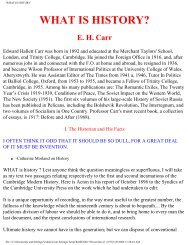The bronze age and the Celtic world - Universal History Library
The bronze age and the Celtic world - Universal History Library
The bronze age and the Celtic world - Universal History Library
You also want an ePaper? Increase the reach of your titles
YUMPU automatically turns print PDFs into web optimized ePapers that Google loves.
THE ARYAN CRADLE I35<br />
<strong>The</strong> original supporters of <strong>the</strong> Aryan hypo<strong>the</strong>sis fell so in love with <strong>the</strong> langu<strong>age</strong>s<br />
<strong>and</strong> with <strong>the</strong> people who originally developed <strong>the</strong>m, that <strong>the</strong>y grew to believe that <strong>the</strong>se<br />
Wiros were superior creatures, with a superior tongue, which <strong>the</strong>y had imposed upon<br />
an inferior <strong>world</strong>. AU good things found in <strong>the</strong> civilisation of Europe were attributed<br />
to <strong>the</strong>m, <strong>and</strong> <strong>the</strong>y became <strong>the</strong> super-men. As far as we can ascertain from <strong>the</strong><br />
linguistic evidence available <strong>the</strong>y had, it is true, evolved a langu<strong>age</strong> which, owing to its<br />
flexibility, was capable of great things, but it is by no means clear that <strong>the</strong> higher<br />
developments, which some of <strong>the</strong> tongues have reached, would have been attained had<br />
not <strong>the</strong> Wiros mixed with people possessing o<strong>the</strong>r ideas <strong>and</strong> o<strong>the</strong>r idioms. <strong>The</strong><br />
evidence of linguistic palaeontology shows that in material culture <strong>the</strong>y were very<br />
backward, <strong>and</strong>, as we shall see later on, aU <strong>the</strong> archaeological evidence tends to show<br />
that in <strong>the</strong>se respects <strong>the</strong>y were far behind <strong>the</strong> peoples whom <strong>the</strong>y conquered, <strong>and</strong> on<br />
whom <strong>the</strong>y imposed <strong>the</strong>ir tongue. <strong>The</strong>ir one important characteristic seems to have been<br />
<strong>the</strong>ir incapacity for learning o<strong>the</strong>r langu<strong>age</strong>s, <strong>and</strong> so insisting that o<strong>the</strong>r folk should<br />
adopt <strong>the</strong>irs. This may have been due to lack of linguistic ability, or to an overbearing<br />
conceit. Probably it was due to both. <strong>The</strong> original Wiros, <strong>the</strong>n, as judged by linguistic<br />
evidence, were far from being super-men.<br />
Ano<strong>the</strong>r fallacy has been <strong>the</strong> behef that <strong>the</strong> Nordic is <strong>the</strong> superior person, <strong>the</strong><br />
" white man " par excellence. <strong>The</strong> Nordic is strong, robust <strong>and</strong> cour<strong>age</strong>ous, <strong>and</strong><br />
possesses certain manly qualities which are much admired ;<br />
also he has taken care for<br />
some thous<strong>and</strong>s of years to impress upon his neighbours that <strong>the</strong>se are admirable<br />
qualities. <strong>The</strong> Nordic has also o<strong>the</strong>r good points, such as honesty <strong>and</strong> a genius for<br />
administration, but he is far from possessing a monopoly of <strong>the</strong> virtues, <strong>and</strong> in many<br />
respects falls behind members of <strong>the</strong> o<strong>the</strong>r European races. <strong>The</strong> works of Gobineau'<br />
<strong>and</strong> later of Madison Grant^ have enumerated his virtues without defining his<br />
limitations, <strong>and</strong> no one, so far as I know, has yet written to extol <strong>the</strong> excellencies of<br />
<strong>the</strong> Alpine or Mediterranean races, who have contributed <strong>and</strong> still contribute much<br />
of what is good in <strong>the</strong> make-up of modern Europe.<br />
During <strong>the</strong> latter part of <strong>the</strong> nineteenth century <strong>the</strong> Germans were eng<strong>age</strong>d in<br />
making <strong>and</strong> consolidating <strong>the</strong>ir empire, <strong>and</strong> to do this <strong>the</strong>y wished to encour<strong>age</strong> <strong>the</strong>ir<br />
7 Gobineau (1853-55). * Grant (1916), (1921).







